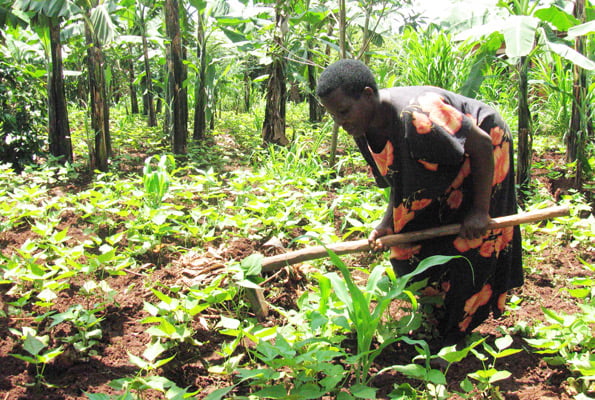Take some good care of your soils

A farmer works in a bean garden. When farmers work with scientists at the garden level, they will find solutions for problems faster and improve the quality of beans. Photo By Micheal J. Ssali
What you need to know:
- Burying dry weeds and tree leaves in the ground is another good way to feed the soil.
The soil in your garden should be good enough to supply the crops with sufficient amounts of water and plant nutrients.
It should be suitable for successful seed germination, root development and plant growth.
Scientists also say that the quality of soil should be judged by its nutrient status, its water holding capacity, aggregate stability and permeability to water and air.
Without these attributes the soil will be useless for agriculture unless some effort is made to apply some fertilisers and water to it.
Due to rapid population growth a lot of pressure is put on the soil to produce all the food and other crops that the population needs.
Often there is a tendency to grow the same crops on the same plots of land nearly all the time, which leads to depletion of the plant nutrients that the soil needs for proper crop growth and development.
We cannot avoid growing crops on the same piece of land that is available to us since the land is not elastic.
Therefore we must continuously provide the plant nutrients and water to the plots where we practice agriculture. All forms of organic matter – livestock droppings and urine as well as rotting grass and animal beddings – are good for enriching the soil.
Mixing them in sufficient amounts with the soil or burying them in the ground is the best practice for naturally sustaining soil fertility in your garden. It is also good to protect the soil against water loss and soil erosion by mulching.
Keeping a cow, some poultry, and a few small animals such as goats and sheep is one sure way for you to constantly get organic manure for your garden.
Burying dry weeds and tree leaves in the ground is another good way to feed the soil.
It is also good practice to grow some fodder grass and trees along the gullies and boundaries of the plot of land for feeding the animals.
Mr Michael Ssali is a veteran journalist,
[email protected]
Their roots hold the soil in place and prevent soil erosion. As much as possible trap rainwater and preserve it in ponds and water tanks for use in the dry season.


